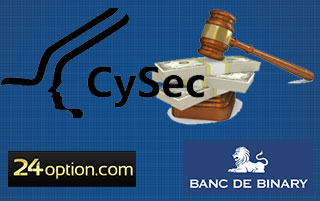Cypriot financial regulator, CySEC, which is well known in the binary industry, has handed out 2 hefty fines to 2 of the industry’s most iconic brokers. Both Banc de Binary Ltd and Rodeler Ltd – 24Option’s parent company – have been fined. Banc de Binary got a €350,000.00 fine while Rodeler got a €156,000.00 fine. The official announcement of the regulator’s decision in the case of Banc de Binary, gives scant details about the reasons for the fine, whereas the Rodeler fine has more detailed information.
It seems that Banc de Binary managed to strike some kind of deal with CySEC to pay a fine and avoid a judicial review of its case. In return CySEC did not make its violations public. The regulator only alluded to the categories of Banc de Binary’s violations, clearly stating that the binary options broker did not comply with articles 28(1), 18(2) a) d) e) i), and 36(1) a) b) d). Although the regulator is not actively hiding any information from the public in Banc de Binary’s case, it is clearly not disclosing it voluntarily either. Instead, any party interested, must go through the laws and charters to get some insight into Banc de Binary’s lack of compliance with financial regulation.
On the other hand, CySEC’s judicial ruling on Rodeler’s wrong doings has a lot of details, voluntarily put forth by the regulator. When looking at the summary for both decisions, it is clear from the information on the top of the page, that Rodeler’s case had a judicial review and ruling, while Banc de Binary’s didn’t. This points to the fact that Rodeler probably did not try to strike a deal with the regulator, choosing instead to go to court.
This move might have cost Rodeler a lot in terms of disclosure of its operations, but it could have saved it some money. After all the fine that CySEC handed down to Rodeler is significantly smaller than the one handed down to Banc de Binary. Unless Banc de Binary’s failure to comply with regulation, endangered the public more or was more severe, there is no way to justify a heftier fine.
It is possible that both cases are not even comparable, and the public will probably never know what Banc de Binary did to get such a punishing fine. In Rodeler’s case, it is possible to see exactly how the company failed to comply with regulation and how much it was fined for every article it violated. Here are some of the details:
- €10,000.00 for not keeping adequate records of advertising material, not keeping adequate records of client suitability, not keeping proper record of complaints, failing to establish a suitable mechanism to address complaints, and failing to establish a clear policy of procedures to establish suitability assessment of clients and the information given to them.
- €20,000.00 for not taking reasonable measures to avoid unjustified aggravation of the operational risk when outsourcing operations to a third party.
- €30,000.00 for failure to act fairly honestly and professionally regarding the best interest of its clients, when providing a trading bonus/benefit.
- €30,000.00 for having misleading information on banners, landing pages and websites.
- €15,000.00 for not giving clients the appropriate information so that they could understand the nature and the risk of the investment service and specific financial instrument.
- €40,000.00 for failing to ask clients to provide necessary information about their knowledge of trading, and experience in the investment field relevant to the specific instrument offered.
- €10,000.00 for failing to have appropriate systems and procedures regarding customer identification and due diligence.
- €1,000.00 because there were no indications that the company made sure that appropriate, efficient and sufficient systems and controls were in place to achieve compliance.
After reviewing both cases there are positive aspects that can be drawn from CySEC’s intervention. First and foremost, it is reassuring to see that the regulator is doing its job and it is investigating claims against binary options brokers. The public now knows that although more transparency is needed, CySEC is at least keeping the brokers in check. The hefty fines will also serve as a deterrent to other brokers. This also serves to force both Rodeler and Banc de Binary to comply with regulation from now on, which should also be reassuring to their clients. For more details on these cases, click here.



